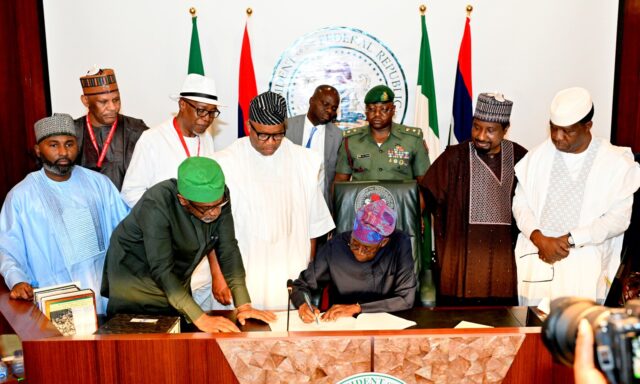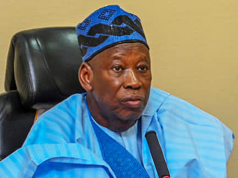President Bola Tinubu, yesterday afternoon, signed the newly passed N70,000 National Minimum wage bill into law, a move that might have been intended to further douse the growing tension occasioned by the proposed nationwide protest.
The president assented to the bill in the course of the Federal Executive Council (FEC) meeting at the Council Chamber of the State House, Abuja.
President of the Senate, Senator Godswill Akpabio, led the leadership of the 10th National Assembly to join the president in the symbolic signing exercise.
Akpabio, later spoke to newsmen at the State House, Abuja after the president signed the National Minimum Wage Bill into an Act, raising the least wage a Nigerian worker at any establishment would be paid from N30,000 to N70,000.
According to the Senate President, the new Act applied to all employers of labour in the country, including federal, state, and local governments, as well as private sector employers.
Akpabio, emphasised that the N70,000 minimum wage was not a maximum, and employers with the capacity to pay more were encouraged to do so.
He praised Tinubu for his commitment to Nigerian workers, noting that the National Assembly passed the bill in one day due to its importance.
Expressing excitement about the new law, the Chairman of the National Assembly said, “The national minimum wage amendment is for the whole nation; for the federal government, for the states, for the local governments, for the private sector and even for individual employers.
“So, I think this is a great day for the workers in the country. We are not only doubling the minimum wage, we have added something on top. Initially it was N30,000, now it is N70,000.
“Like I said, this is minimum, this is not maximum. Any employer that has the capacity can pay as much as you want, but no Nigerian worker will offer services and be paid anything less than N70,000 from today. That is the implication of this Act.
“It applies all over the nation and we are excited that this is happening at a time like this, through President Tinubu, a man who cares for the Nigerian workers and you see what we are doing in the National Assembly.
“When it came, the entirety of the National Assembly moved and passed the bill in one day out of excitement. We felt that this was not something we could delay. So, I think the workers are happy,” he said.
Speaker of the House of Representatives, Hon Tajudeen Abbas, also said the signing of the new law was a demonstration of Tinubu’s care for the wellbeing of Nigerians.
The Speaker, represented by the House Leader, Prof. Julius Ihonvbere, said, “This is an action from the president to show that he cares about the Nigerian people.
“In addition to signing the North East Development Commission, the North West Development Commission and the South East Development Commission, this has never happened in Nigeria.
“So, I think this movement from N30,000 to N70,000 and reducing the negotiation (from five to three) years is a clear demonstration of a commitment to redirect, refocus and reposition Nigeria for greatness.”
Deputy Senate President, Senator Jibrin Barau and the Leader of the Senate, Senator Opeyemi Bamidele, also commended the president.
Similarly, the Nigeria Labour Congress (NLC) has expressed happiness at the quick assent given to the new minimum wage by Tinubu.
Speaking in an interview with THISDAY yesterday, the NLC’s Head of Information and Publicity, Benson Upah, said the labour centre would like to see its immediate implementation.
“We are happy that he has given his assent and it is our wish that payment complete with arrears will begin immediately.
“And it is also our wish that governors comply immediately, all entities that are affected by the law comply immediately and appropriately,” he said.
Meanwhile, Akpabio, has disclosed that the amendment to the 2024 Appropriation Act, which would fund the new minimum wage, was expected to be passed by the National Assembly tomorrow.
Also, yesterday, the two chambers of the National Assembly assured the Nigerian women of Gender Responsive Budgeting in coming fiscal years.
Asked how soon the amendment to the budget would be ready, Akpabio said, “We have gone very far with it and I expect that by Wednesday it will be passed.”
In a related development, the two chambers of the National Assembly have assured the Nigerian women of Gender Responsive Budgeting in coming fiscal years.
The assurance was separately made by Akpabio and Abbas.
They spoke at the beginning of two-day workshop on the role of legislators in enhancing gender responsive legislations and budgeting in Nigeria.
The forum was organised by the National Institute for Legislative and Democratic Studies ( NILDS) in collaboration with the United Nations Entity for Gender Equality and the Empowerment of Women (UN Women) for female parliamentarians in Nigeria.
The President of the Senate, represented by Senator Sunday Karimi, said equitable and inclusive society was part of the legislative agenda of the 10th Senate, which has gender responsive budgeting as parts of its cardinal goals.
“The Senate and by extension, the National Assembly, will ensure gender responsive budgeting every fiscal year in making Nigeria, equitable and inclusive society for all,” he said
Making similar assurance, Speaker of the House of Representatives, represented by Ihonvbere, said the House was committed to gender responsive budgeting and representation.
Abbas said, “In the House of Representatives, our commitment goes beyond gender responsive budgeting to gender representation as obtainable in other countries of the world.
“The current statistics which show that women representation in the current 10th National Assembly is 3.91 per cent, as against 23.8 per cent in Kenya, 33.81 per cent in Uganda, 37.5 per cent in Tanzania etc, do not portray Nigeria in good light and shall surely be looked into legislatively ahead of the 2027 general elections,” he said.
In his welcome address, the Director General of NILDS, Prof. Abubakar Sulaiman, said the collaborative workshop was apt and timely considering the increasing advocacy for gender mainstreaming and Gender Responsive Budgeting.
According to him, the overall objective of the workshop was to create a platform for discussions and actions to advance Gender Responsive Budgeting in Nigeria, with the ultimate goal of creating a society where everyone, regardless of gender, has equal opportunities and access to resources.
He said, “There is no doubt that Gender Responsive Budgeting (GRB) brings together gender equality and public financial management initiatives, and seeks to improve the results of budgets in general and to advance gender equality and women’s empowerment.
“Gender Responsive Budgeting also focuses on key economic and social issues that are often overlooked in conventional budget, policy analysis and decision-making.
“It remains a critical tool for advancing gender equality and women’s empowerment. It involves assessing, planning, implementing, and evaluating government budgets with a gender perspective to ensure that public resources are used to reduce gender disparities and promote equitable outcomes.”







